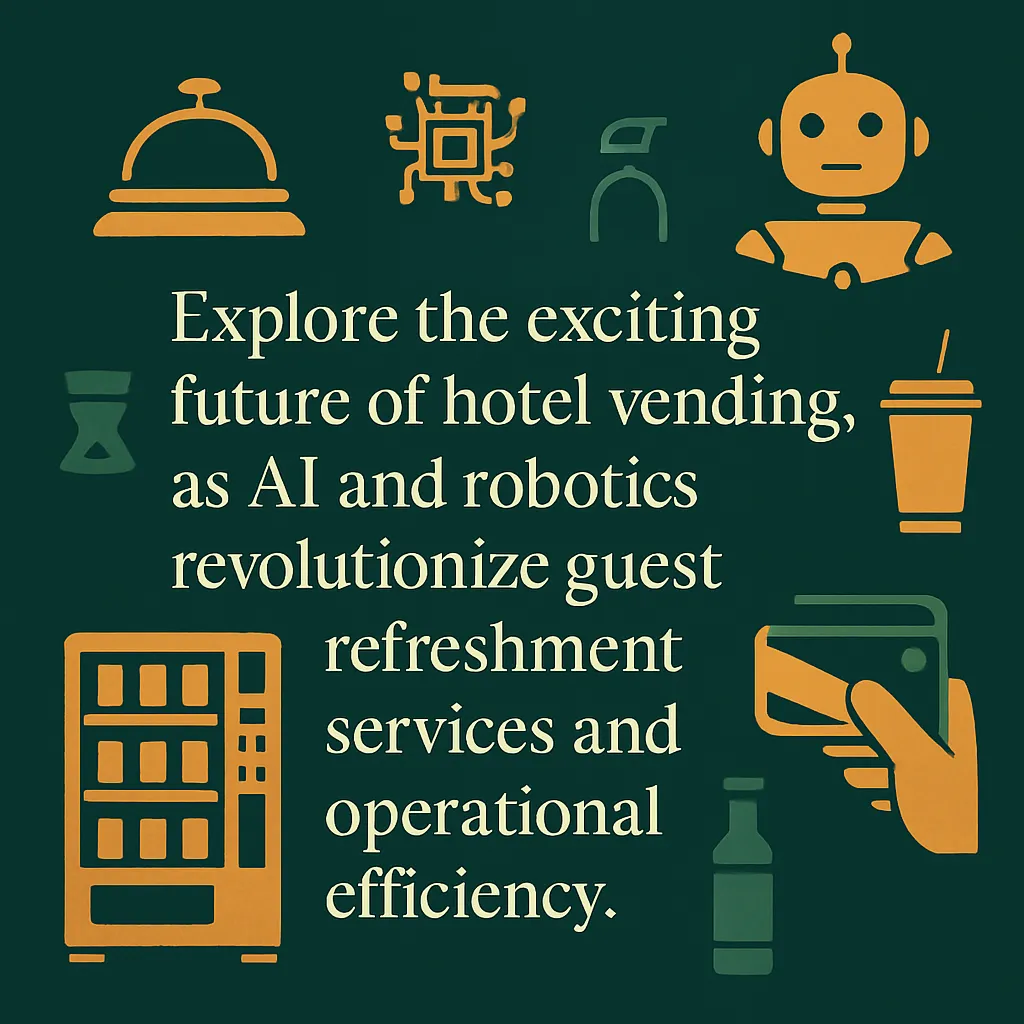Future of Vending: AI and Robotics in Hotels
Explore the exciting future of hotel vending, as AI and robotics revolutionize guest refreshment services and operational efficiency.
Back to Vending for Hotels ResourcesExplore the exciting future of hotel vending, as AI and robotics revolutionize guest refreshment services and operational efficiency.
Back to Vending for Hotels ResourcesIntegrating artificial intelligence and robotic systems into hotel vending creates a new standard for guest convenience, personalization, and operational innovation.
![]() 24/7 access to diverse products with smart recommendations
24/7 access to diverse products with smart recommendations
![]() Touchless transactions and automated dispensing for hygiene and speed
Touchless transactions and automated dispensing for hygiene and speed
![]() Enhanced operational efficiency through predictive stocking and remote management
Enhanced operational efficiency through predictive stocking and remote management

The hospitality industry is constantly seeking innovative ways to enhance guest experiences and streamline operations. The integration of artificial intelligence (AI) and robotics into hotel vending machines represents the cutting edge of this evolution. Far beyond simple snack dispensers, these advanced systems are redefining convenience, personalization, and efficiency for modern hotels.
AI brings a new level of intelligence to hotel vending. Imagine a machine that learns guest preferences, suggesting items based on past purchases or even time of day. AI algorithms can optimize inventory by predicting demand, ensuring popular items are always in stock and reducing waste. This predictive capability minimizes manual oversight, freeing up hotel staff and ensuring a seamless, self-service experience for guests. Furthermore, features like touchless payment technology and customizable product selections cater to growing guest expectations for hygiene and variety.
Robotic vending units, including smart coolers and automated kiosks, offer hotels a significant upgrade from traditional minibars. These units can dispense a wide array of products, from gourmet food and beverages to essential toiletries and travel accessories, all available 24/7. Robotic systems facilitate rapid restocking and can even deliver items directly to guest rooms in some advanced setups, providing an unprecedented level of convenience. For hotels considering these cutting-edge options, exploring solutions like AI Vending Coolers for Hotels provides insights into their potential.
Beyond guest satisfaction, AI and robotics offer substantial operational benefits. Automated inventory management reduces labor costs associated with manual stocking and tracking. Real-time sales data provides valuable analytics, allowing hotels to optimize merchandising strategies and pricing. The reduction in human error and enhanced security features further contribute to a more efficient and profitable vending operation. Hotels can also leverage these advancements to meet evolving guest demands for healthier options, as these systems can monitor sales trends for specific product categories. For instance, understanding the nuances of staff lounge vending in retail environments can offer parallel insights into providing convenient amenities efficiently.
As technology continues to advance, the role of vending in hotels will only grow. We can expect more interactive interfaces, seamless integration with hotel loyalty programs, and an even wider range of products and services delivered through automated channels. This move towards intelligent, robotic vending creates a competitive advantage for hotels, catering to digitally native travelers and offering a superior, modern hospitality experience. Learn more about how businesses are adapting similar technologies in different sectors by exploring AI Coolers vs Traditional Vending Machines.
AI and robotics are driving a shift towards smart, personalized, and efficient vending solutions in hotels, enhancing guest experiences and streamlining operations.
AI offers predictive stocking, personalized recommendations, automated pricing, and real-time inventory management, leading to increased sales and reduced waste.
Yes, robotic vending can provide 24/7 access to goods, quicker delivery of items, and novel, engaging experiences for hotel guests.
While initial investment might be higher, the operational efficiencies, reduced labor costs, and increased revenue potential often lead to a strong return on investment for hotels.
From gourmet snacks and drinks to travel essentials, personal care items, and even freshly prepared meals, the possibilities are expanding rapidly.
They typically feature advanced cashless payment options (mobile pay, credit card) and robust security systems, including cameras and secure dispensing mechanisms.
The aim is to complement, not replace, staff. These technologies free up employees from routine tasks, allowing them to focus on higher-value guest interactions.
They often come with remote monitoring and predictive maintenance capabilities, reducing downtime and optimizing service schedules.
AI can analyze purchasing patterns and guest preferences to recommend products, offer customized promotions, and anticipate demands.
Many new machines are designed with energy efficiency in mind and can help reduce waste through optimized inventory and demand forecasting.